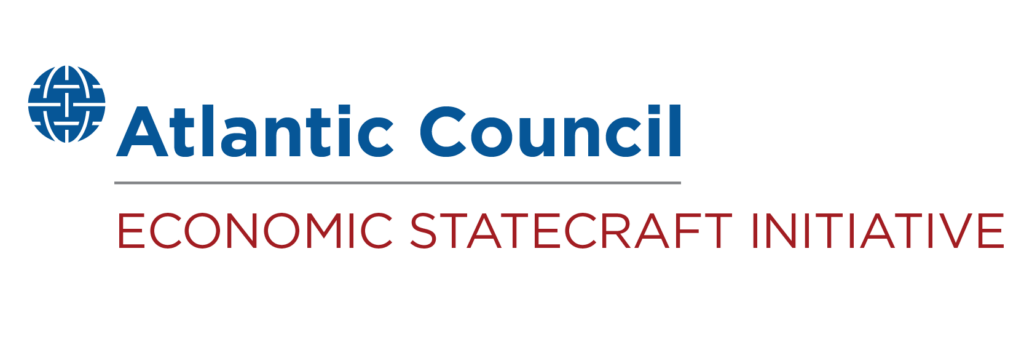On February 20, Economic Statecraft Initiative Director Kimberly Donovan testified to the US-China Economic and Security Review Commission at a hearing titled, “An Axis of Autocracy? China’s Relations with Russia, Iran, and North Korea.” Below are her prepared remarks.
Commissioner Friedberg, Commissioner Stivers, and members of the Commission, it is an honor to speak with you today about China’s role in the Axis of Autocracy and specifically on economic linkages and sanctions evasion.
While I am currently employed by the Atlantic Council, I am providing testimony in my personal capacity. The views I express today are my own and do not represent those of the Atlantic Council.
My testimony draws from a body of research my team and I have conducted at the Atlantic Council measuring the effectiveness of economic statecraft tools targeting Russia and our assessment that China is enabling Russia as well as Iran to circumvent and evade Western sanctions. We have coined this network “the axis of evasion.”
My testimony also draws on my prior experience as a career civil servant in the US federal government for fifteen years in the Intelligence Community, the Department of the Treasury, the National Security Council, and most recently serving as head of intelligence at Treasury’s Financial Crimes Enforcement Network (FinCEN). I spent my career in national security “following the money” of illicit actors, terrorists, and rogue states to safeguard the US financial system from abuse and protect the American public from harm. My experience has informed my understanding of sophisticated money laundering techniques and my perspectives on how US adversaries work together to take advantage of the global financial system and evade US sanctions.
The United States and many of its Western partners have levied significant sanctions on Russia, Iran, and North Korea. Being sanctioned by the West is one of the few things these rogue states have in common. Sanctions severely restrict these countries’ access to the US-led global financial system, limit their ability to trade in commodities, generate revenue, and import sophisticated technology. Many Chinese individuals and entities are also sanctioned by the United States and its allies. When the United States closed the proverbial front door to the global financial system, China opened the backdoor for these countries to transact and conduct trade often outside the reach of US sanctions and monitoring authorities. Against this backdrop, my testimony focuses on three key areas:
- China, Russia, Iran, and North Korea have constructed elaborate systems to evade US sanctions;
- Third country procurement networks enable these sanction evasion systems; and
- These systems have limitations that may present opportunities for US action, and I will conclude my remarks with a set of policy recommendations for consideration.
First, I’d like to briefly discuss the elements that create the systems for sanctions evasion used by China, Russia, Iran, and North Korea.
Starting with the shadow fleet, which is a key tool for sanctions evasion. Russia, Iran, and North Korea use a network of old and poorly maintained tankers to transport sanctioned oil and goods while evading sanctions and maritime regulations. These ships frequently change flag registrations and obscure their ownership, allowing billions in illicit trade.
Alternative currencies and payment systems provide another mechanism for sanctions evasion. China’s opaque financial system provides Iran and Russia the opportunity to launder the proceeds of oil exports by facilitating payments in renminbi (RMB) and bypassing the US dollar and financial system. Further, Russia has been working to integrate its SPFS (Sistema Peredachi Finansovykh Soobcheniy) payment system with China’s CIPS (Cross-Border Interbank Payment System) to facilitate cross-border payments, while Iran and North Korea use Chinese money laundering networks and witting or unwitting Chinese banks to access global markets.
Meanwhile, complex money laundering networks facilitate Iran’s movement of oil revenue through front companies, financial facilitators based in Hong Kong and the United Arab Emirates (UAE), and opaque banking channels to convert RMB into more usable currency. Separately, North Korea uses Chinese and UAE-based intermediaries to launder its ill-gotten gains from cybercrime.
We are also seeing Hong Kong increasingly become a hub for sanctions evasion. China’s influence over Hong Kong and the region’s financial opacity allows shell companies and Chinese bank subsidiaries to provide access to the global financial system for sanctioned Russian, Iranian, and North Korean actors, potentially leveraging offshore interbank US dollar clearing systems.
Finally, barter trade among sanctioned regimes allows Russia, Iran, and North Korea to bypass financial restrictions by exchanging goods and weapons directly. Russia allegedly trades food and oil for North Korean weapons, while Iran and China engage in barter transactions involving oil, food, and manufactured goods.
The second point I’d like to discuss is the involvement of third country procurement networks. While China plays a key role in sustaining these sanctioned economies, third countries help them stay afloat. India, Malaysia, and the UAE, as examples, facilitate sanctions evasion by serving as transshipment hubs and financial facilitators for Russia, Iran, and North Korea. For instance, Russia’s rupee surplus from oil sales to India created the environment for India to emerge as a primary transshipment hub and the second largest provider of sensitive technology to Russia after China.
Finally, while these countries have developed complex sanction evasion mechanisms, they are not without limitations. China’s reliance on US dollar markets for now, make it vulnerable to secondary sanctions and financial pressure, limiting its ability to support sanctioned states indefinitely. Further, complex money laundering schemes are costly and susceptible to disruptions and enforcement actions. While shadow fleet operations pose environmental and legal risks that could justify broader international enforcement actions.
To conclude my remarks, I would like to offer the following recommendations to address the challenges I described:
- Congress should direct the Administration to develop a comprehensive national security strategy and economic statecraft approach that accounts for the economic and financial ties between China, Russia, Iran, and North Korea and considers these states as a network of actors. The strategy should include both punitive as well as positive measures to drive a wedge between these rogue states and the third countries that enable their activity.
- To inform this strategy, Congress should fully resource the departments and agencies responsible for collecting and analyzing financial intelligence to assess the financial connectivity among these states and those responsible for sanctions enforcement and investigations.
- Congress should direct the Administration to strengthen multilateral coordination on China’s involvement in sanctions evasion by enhancing information sharing and encouraging joint investigations with foreign partners into money laundering and illicit trade networks operating in China and target vulnerabilities to disrupt and deter sanctions evasion.
- Congress should request the Secretary of the Department of the Treasury, in coordination with the Federal Reserve, and other competent authorities, to assess offshore interbank US dollar clearing systems to determine if they are being used to circumvent US sanctions and offer recommendations to the Federal Reserve to increase transparency of these systems and ultimately security of US dollar settlements and payment rails.
- Congress should direct funding towards anti-money laundering and countering the financing of terrorism capacity building within the United States and abroad to strengthen the resilience of the global financial system. This includes working with India, the UAE, and Malaysia to reduce their role in facilitating sanctions evasion and encouraging Chinese authorities to identify and weed out illicit financial schemes within its financial system, or risk secondary sanctions as they relate to Russia and Iran.
- Congress should request the Executive Branch to assess the environmental risk and piracy risk associated with the shadow fleet and offer recommendations to leverage international and maritime law and safety regulations, in coordination with European allies, to justify seizing high-risk vessels linked to sanctioned oil trade. Congress should also request the Executive Branch collaborate with European allies to identify the true beneficial owners of the shadow fleet tankers to hold them accountable through restrictive economic measures or civil or criminal legal proceedings.
By combining financial, economic, legal, intelligence, and diplomatic tools, the United States can increase the cost and risk for China’s participation in sanctions evasion while disrupting the financial lifelines Russia, Iran, and North Korea have come to rely on.
Thank you for the opportunity to speak with you today. I look forward to your questions.
Image: The east side of the US Capitol in the early morning. Senate Chamber in foreground.I invite you to view some of my other Washington photos:

